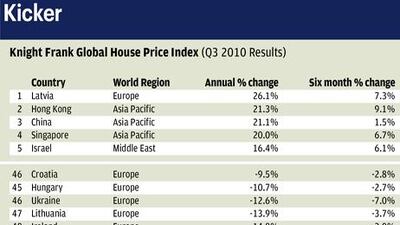The global recovery in house prices is "losing steam", a new report has found. After widespread increases in the first half of this year, 56 per cent of the countries tracked by Knight Frank's Global House Price Index reported declines in the third quarter.
Property prices in Dubai dropped 6.1 per cent in the third quarter compared with the same period last year. Property prices in the emirate have dropped 10.1 per cent in the six months to the end of September, the biggest drop of the markets tracked by Knight Frank in that period.
The company's assessment for Dubai is in line with other reports. Colliers Internationalrecorded a 6 per cent drop in the third quarter from the second quarter, hitting its lowest level since the second quarter last year.
"I think the issue in a lot of these markets [like Dubai] is that it is difficult to find where prices level off," said Liam Bailey, Knight Frank's head of residential research.
"There is no historical benchmark."
Asia continued to post the strongest results, with Hong Kong prices up 21.3 per cent from the same period last year. Beijing and Shanghai are up 21.1 per cent and Singapore prices are 20 per cent higher, says Knight Frank.
Europe is a marked contrast. Ireland is the worst performer of the 48 countries tracked by Knight Frank, posting a 14.8 per cent decline on last year's third quarter. Spain is down 3.7 per cent, while Greece is down 3.1 per cent. In the UK prices dropped 0.8 per cent, although the market is still up 4.5 per cent compared with last year's figure.
"There is still a lot of concern about the debt crisis and the ongoing problems in credit markets around the world," said Mr Bailey. "Banks have become more risk-averse."
In total, 14 countries reported negative growth in the third quarter after posting several quarters of gains, says Knight Frank. Overall, the global index increased 3.1 per cent, down from a 4.3 per cent increase in the second quarter.
In the US, annual growth has fallen to 0.6 per cent, with average prices at mid-2003 levels.

